Belarus: Were executed Minsk metro bombers framed?
- Published
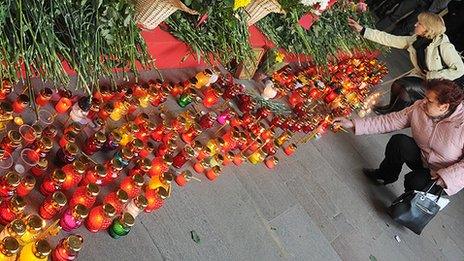
Fifteen people were killed in the Minsk metro bombing
Earlier this year two men were executed for planting a bomb on the metro in the Belarus capital Minsk, but some believe they were forced to confess and the bomb was the work of the state security services.
The Secretary General of Interpol, Ronald K Noble, should have little to fear from the grieving mother of a dead son, shot by sentence of a Belarus court this March for his part in last year's Minsk Metro bomb - or so you might have thought.
But thanks to an extraordinarily brave campaign by bereaved parent Lyubov Kovalyova, who is regularly watched by the Belarus secret police (still called the KGB), grave doubts about the guilt of the two men convicted for the bomb have arisen.
Now the Belarus KGB is being accused of planting the bomb, rigging a show trial and torturing confessions out of the two suspects.
Noble, an American appointee, who endorsed the state investigation, is facing serious questions about his judgement.
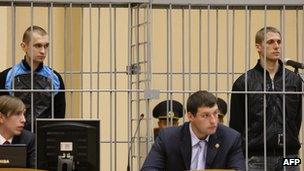
The European Union cristicised the execution of Dmitry Konovalov and Vladislav Kovalyov
It was on April 11, 2011, that a bomb exploded on the Minsk Metro, killing 15 people.
Two days later President Alexander Lukashenko - dubbed the "the last dictator in Europe" - proclaimed that two men had confessed.
The men were Dmitry Konovalov, 25, the alleged bomber, and, his accomplice, Vladislav Kovalyov, also 25, who was Lyubov's son.
The following month Secretary General Noble arrived in Minsk and praised "the high professionalism" of the Interior Ministry officials for solving the case so quickly - long before their trial took place.
In September 2011 Konovalov and Kovalyov were tried. They were found guilty in November and in March this year they were executed by a bullet to the back of the head.
'Torture and beatings'
I went undercover to Belarus and drove three hours east of Minsk to meet Lyubov Kovalyova.
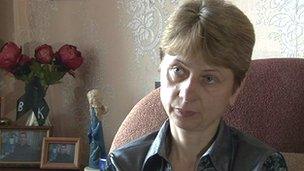
Lyubov Kovalyova is questioning evidence that convicted her son and Dmitry Konovalov
She is often watched by the KGB, but she told us that it was safe to see her.
A slight, frail woman, racked with grief, I put to her the official version - that the men had a fair trial.
"The court has not a single piece of proof of guilt not only of my son - who was dragged into this - but also of Dima Konovalov - apart from Dima's confession, which he gave under torture," she said.
"They were beaten to such an extent that when we were shown the video recording of Dima being interrogated, he could barely speak. He could barely sit," she added.
Both inside and outside Belarus, I have interviewed opposition activists who told me that they were tortured by the Belarus KGB in their notorious prison, the Amerikanka - named after a 1920s Chicago prison design.
In December 2010 after a bitterly disputed election, victims were forced to strip naked and stand in stress positions while masked guards swished electric batons.
Icicles hung from open windows. The temperature was -20C outside.
The Minsk metro bombing came amid an atmosphere of increasing instability. Mr Lukashenko had used violence to put down protests by the regime's opponents.
Ms Kovalyova said the two men never stood a chance of a fair trial.
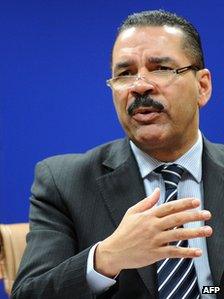
Interpol's Secretary-General Ronald K. Noble praised the speed of the investigation
"Already on the 13th [April] at 9 o'clock in the morning on the radio, I heard Lukashenko's announcement that the culprits had already been arrested, and that they would receive the harshest punishment - they would be shot," she said.
"He said that the boys had been interrogated, and by 5 o'clock they had already confessed."
In May 2011, Interpol Secretary General Noble told a press conference in Minsk the case was solved so quickly because of the high professionalism of the police, officials in the Ministry of Internal Affairs and other ministries.
Adding, "the technology and CCTVs that you have in place, and because of the strong relations that the Ministry of Internal Affairs and Interpol in Minsk has," also helped.
The Secretary General seemed unaware that the KGB led the investigation and that it has a history of torturing people in the Amerikanka.
In 2004 a European report blamed the Lukashenko regime for the disappearances of four political rivals of Lukashenko - killed by a death squad.
More than 30 others, the BBC has been told, were also killed by the death squad.
Conflicting evidence
The CCTV evidence praised by Secretary-General Noble was not credible, said Lyubov Kovalyova.
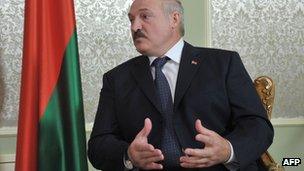
Alexander Lukashenko came to power in 1994
"The Russian FSB [who were helping with the investigation] analysed it for the court and said it was edited,"
"The photograph of the man with the bag in the metro, and Dima, the FSB also found, were not the same height or complexion," she added.
Lyubov explained that the man with the bag and Dima were different people and at the trial there were three bags of different colour, size and weight.
"Where exactly the bag was, the court could not establish - or indeed whether there was a bag at all -
"No piece of the bag - fragment of a lock or metal. If there was a bag, no remains of one were found in the remains of the explosion," she added.
Our own investigation raises a series of questions about the CCTV evidence endorsed by the Secretary-General.
In addition, the state's evidence said that the alleged bomber, Konovalov, was present when the bomb went off.
Lyubov says no particles from the explosion were found on either suspect.
The state also says that Konovalov walked back to his flat and was there at six o'clock sharp - a journey of four minutes. I walked it and it took me 26 minutes.
Exile and co-founder of the Belarus Free Theatre, Natalia Koliada, not only believes that the two men who were shot were innocent, but blames the secret police.
"This was a KGB bomb," she said. "There are no facts whatsoever to prove something else."
It is not clear why, if the authorities needed suspects, Konovalov and Kovalyov were chosen. Neither was politically active or linked to any party or movement.
A spokesman for Interpol, external denied that the presumption of innocence was breached in this case and disputed our conclusions about the evidence. In a statement it said:
"Ronald K. Noble, Interpol Secretary General concluded that the Belarusian criminal investigation was professionally conducted and that the arrests of Dmitry Konovalov and Vladislav Kovalev solved the case of who was criminally responsible for the bombing.
"Secretary General Noble stands by that statement today. … Advancing one-sided false claims about murderous terrorist conduct can only undermine public confidence in the media."
As I left Lyubov Kovalyova, she told me that the state refuses to tell her where her executed son lies buried. "They are torturing me still."
Listen to John Sweeney's report from Belarus in Torture in the 21st Century at 1100 BST on BBC Radio 4. Watch his full report Newsnight at 2240 BST on BBC Two. Or catchup afterwards on BBC iPlayer.
- Published19 March 2012
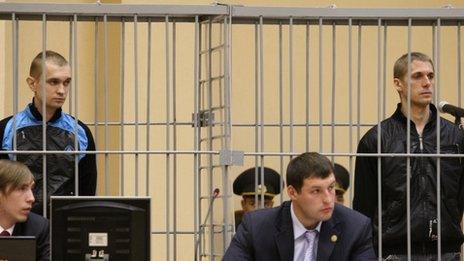
- Published27 January
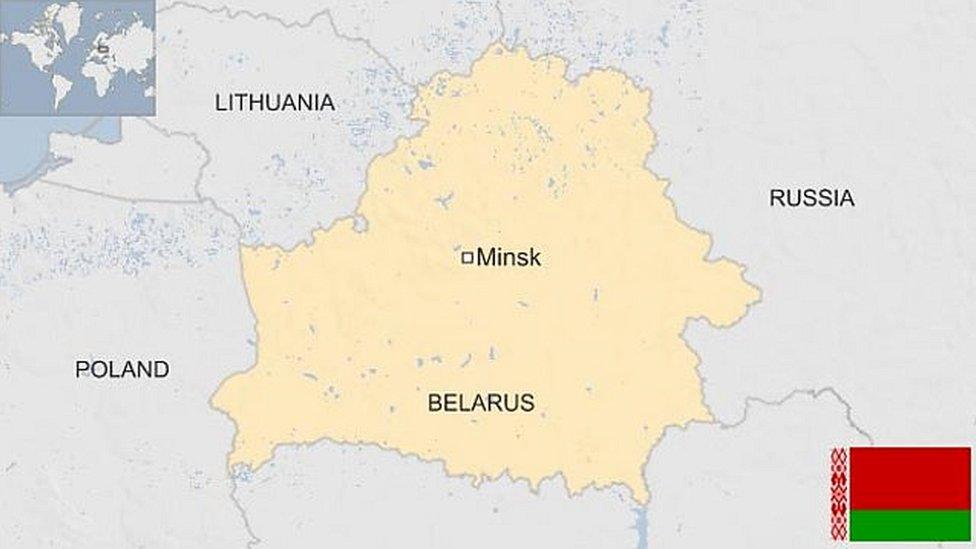
- Published1 March 2011